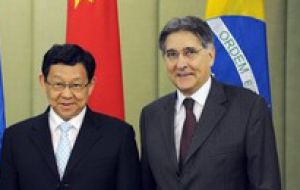MercoPress. South Atlantic News Agency
China ready to increase trade and investments in Brazil but infrastructure lacking
 Commerce minister Chen Deming meets counterpart Pimentel
Commerce minister Chen Deming meets counterpart Pimentel China moved to smooth economic relations with Brazil on Monday, saying it was open to more Brazilian exports and that Chinese firms will broaden their investments in the country.
Rapid expansion in trade and investment between the two emerging economies has brought tensions, especially from Brazilian manufacturers who complain that cheap Chinese imports are destroying their competitiveness.
Last year China surged to become the biggest direct investor in Brazil but it has been concentrated in commodities rather than in infrastructure or high-tech areas that create the higher-value “smart jobs” Brazilian President Dilma Rousseff wants.
Chinese Trade Minister Chen Deming, who is leading a delegation of more than 40 companies in Brasilia, said his country's firms were eager to tap booming consumer demand in Brazil.
“We have the intention and the will to broaden our investments, in infrastructure, green technology, high-technology and tourism. We had deeper discussions,” he told a news conference.
He added Chinese firms were in talks for about 1 billion US dollars in new investments, including a 200 million USD plan by Sany Heavy Equipment International to set up local production.
Brazilian executives who met members of the Chinese business delegation said there was a major interest in investing in Brazil's overloaded port and grain-storage infrastructure to reduce the cost of Chinese imports.
Chen Deming's visit is a follow-up to President Rousseff's trip to Beijing last month in which she secured concrete promises that China would seek to buy more from Brazil than just raw materials such as iron ore and oil.
The countries signed deals in areas ranging from defence to agriculture, as well as plans for developing infrastructure as Brazil prepares to host the 2014 World Cup and the 2016 Olympics.
Rousseff returned with pledges of investment, including a plan by Taiwanese electronics giant Foxconn to invest up to 12 billion USD to dramatically increase production of Apple Inc's products in Brazil. Brazilian businesses also want to open up Chinese markets for value-added exports.
Brazil has a trade surplus with China but only because of its huge exports of commodities, which made up 83% of Brazil's sales last year
Brazilian Trade Minister Fernando Pimentel told the news conference that Brazil expected to expand its exports to China by about 20% this year, up from 30.8 billion USD in 2010. He estimated Chinese investments in Brazil this year would total 8 billion, down from around 17 billion USD last year.
Chen Deming said that Brazil's exports to China “should be diversified” and that China would welcome an increase. But he also cautioned that Brazil needed to open up and diversify its own economy in order to expand its export base.
“There is a big interest among Chinese executives in investing more in Brazil. There has to be an environment favourable for foreign investment ... that way we can create more jobs in Brazil,” he said.




Top Comments
Disclaimer & comment rules-

Read all comments“Last year China surged to become the biggest direct investor in Brazil but it has been concentrated in commodities rather than in infrastructure or high-tech areas that create the higher-value “smart jobs” Brazilian President Dilma Rousseff wants.”
May 17th, 2011 - 11:42 pm 0Everybody wants to invest in a country to maximise the return that that country can provide to the investor.
Thus China builds a specialist port to handle the China-purchased raw materials.
Thus USA extents huge lines of credit for the USA firms to help build for Olympics, World Cup etc.
Thus Foxconn builds Apple (etc) factories in Brasil - and expects to export most of the HUGE new profit back to Taiwan.
Nobody gives something for nothing.
Brasil will get contract-employment and some physical artifacts (football stadiums, typically) that should last perhaps 20 years.
What it will not get is a command-economy directed and effected pan-national infrastructure.
What it will not get is the education of its people.
These need INTERNAL ambitions, structures, plans, programmes, completions, quality controls, maintenence, re-build schedules . . .
and most of all, they need the erradication of state corruption.
Once any single one of these projects is skimmed all the way down the line, there is very little left for the project itself.
Multiply this by EVERY SINGLE PROJECT on the nation's books, and you get a truer measure of Brasil's problem.
Commenting for this story is now closed.
If you have a Facebook account, become a fan and comment on our Facebook Page!